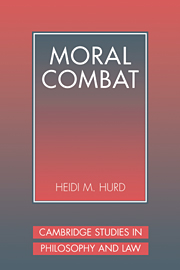Book contents
- Frontmatter
- Contents
- Preface
- Acknowledgments
- Part I The Dilemma of Legal Perspectivalism
- Part II Sources of the Dilemma of Legal Perspectivalism
- Part III The Moral Case for Legal Perspectivalism
- 7 Practical Errors: Pragmatic Foundations for Legal Perspectivalism
- 8 The Rule of Law Values: Principled Foundations for Judicial Perspectivalism
- 9 The Values of Democracy and the Separation of Powers: Principled Foundations for Constitutional Perspectivalism
- Part IV The Moral Case Against Legal Perspectivalism
- Part V Resolving the Dilemma of Legal Perspectivalism
- Bibliography
- Index
8 - The Rule of Law Values: Principled Foundations for Judicial Perspectivalism
Published online by Cambridge University Press: 05 November 2011
- Frontmatter
- Contents
- Preface
- Acknowledgments
- Part I The Dilemma of Legal Perspectivalism
- Part II Sources of the Dilemma of Legal Perspectivalism
- Part III The Moral Case for Legal Perspectivalism
- 7 Practical Errors: Pragmatic Foundations for Legal Perspectivalism
- 8 The Rule of Law Values: Principled Foundations for Judicial Perspectivalism
- 9 The Values of Democracy and the Separation of Powers: Principled Foundations for Constitutional Perspectivalism
- Part IV The Moral Case Against Legal Perspectivalism
- Part V Resolving the Dilemma of Legal Perspectivalism
- Bibliography
- Index
Summary
According to Lon Fuller, a legal system can accomplish the rule of law only if its enactments are general, public, prospective, clear, logically consistent, practically possible, relatively constant, and predictably applied. With the exception of the first (which simply states a formal condition for there to be a system of rules at all), these requirements speak to the importance of three values: the promotion of individual liberty, the protection of reliance interests, and the preservation of equality.
It has been commonly claimed that these rule of law values “generally define the job of judging” They “justif [y] the judiciary having a limited role in a democracy such as ours…. [by] mandat[ing] that judges should not dispense justice on some ad hoc, case-by-case basis” Implicit in this claim is the view that rule of law values are reasons for action that are unique to adjudicators. They enter into the balance of reasons that justifies judicial action, but not into the balance of reasons that justifies private conduct. As such, the rule of law values serve as a source of role-relative morality that might well justify the punishment of justified offenders.
In this chapter, I shall articulate the nature of these values and the reasons to think them role-relative. While these values are well known in the jurisprudential literature, their ability to provide principled foundations for role-relative morality is variable, and hence their separate treatment is necessary. Throughout this discussion it is important to assume that error is not a concern. This assumption will allow us to isolate whether there are any role-relative reasons for action that are principled rather than pragmatic.
- Type
- Chapter
- Information
- Moral CombatThe Dilemma of Legal Perspectivalism, pp. 203 - 225Publisher: Cambridge University PressPrint publication year: 1999

